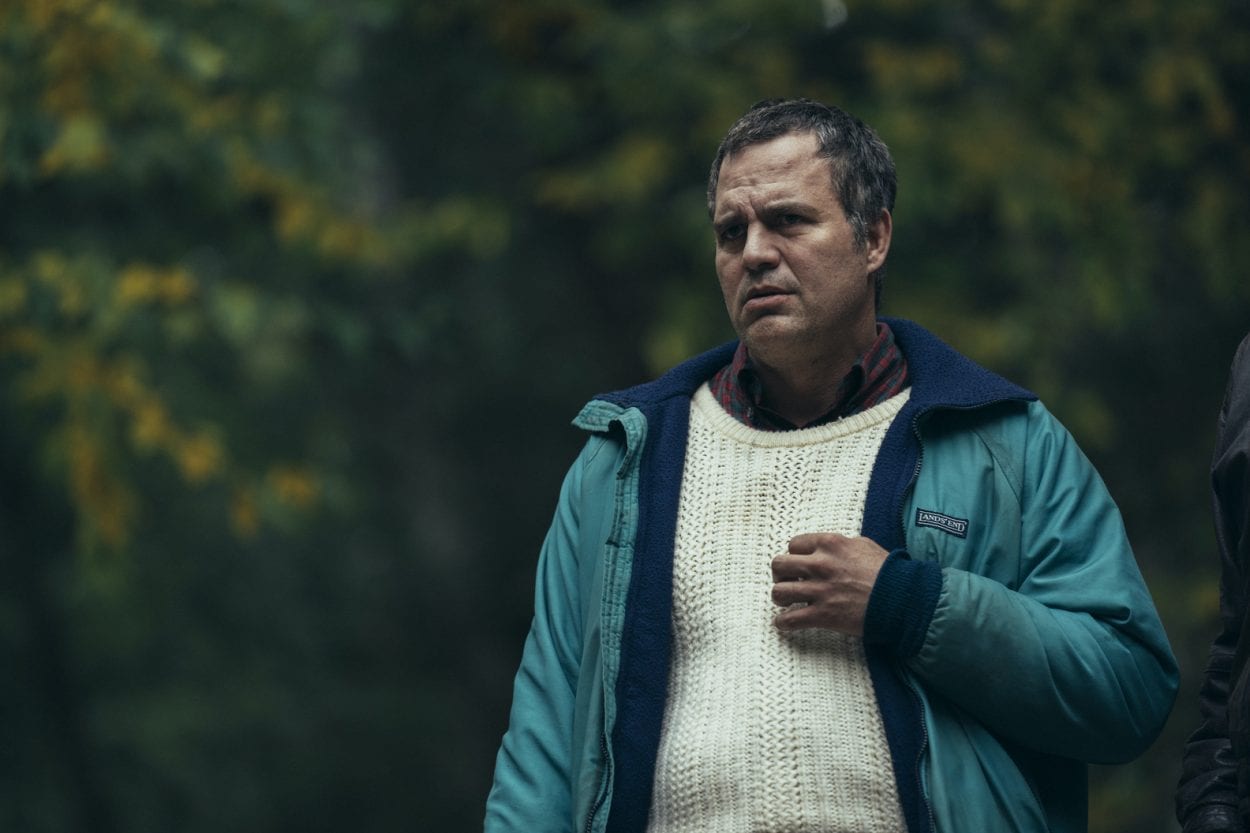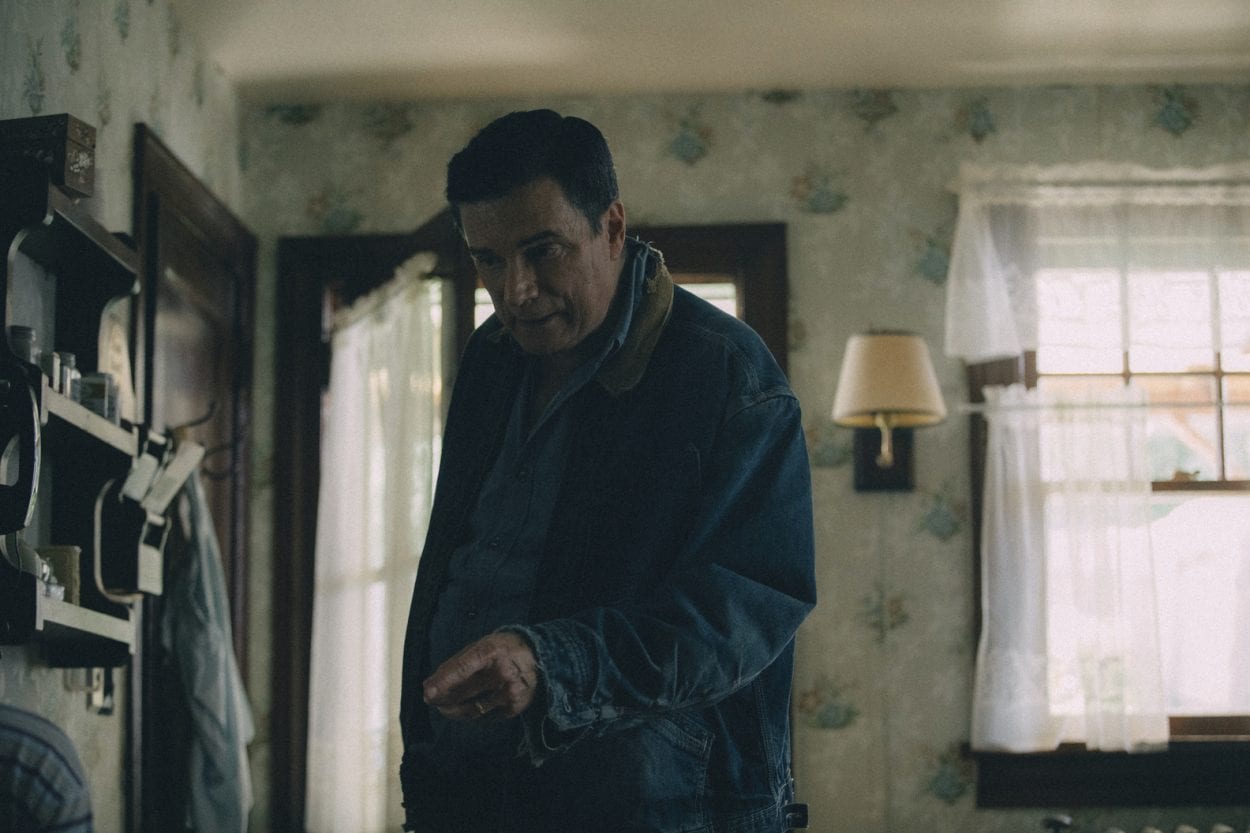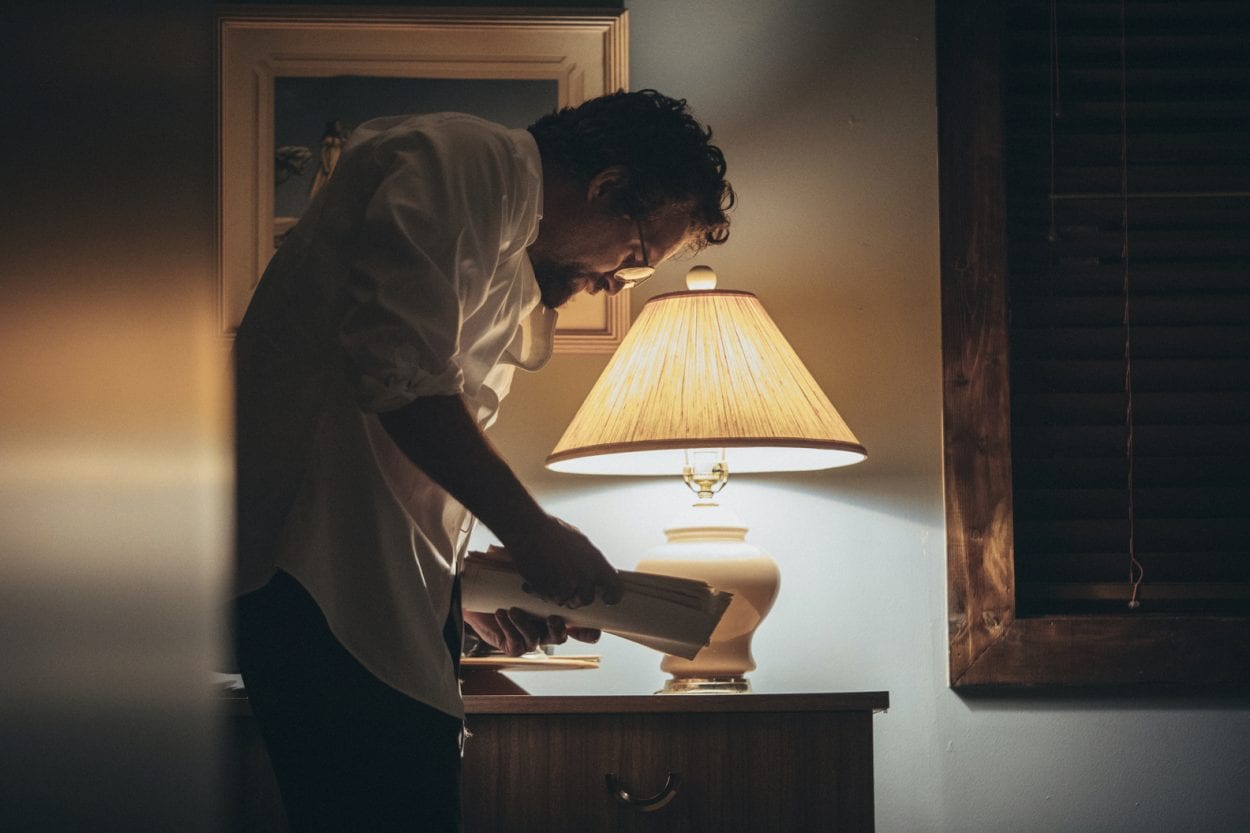I Know This Much Is True S1E6 picks up where S1E5 left off. Thomas has been released from Hatch. Dominick takes him to the cemetery and then The Falls, because that’s where Thomas wants to go. They don’t go down to the water, though. Dominick says it’s too cold. They can come back when it’s warmer. Let’s get something to eat.
Cut to the two settling in for the night at Dominick’s. Madonna’s “Cherish” is on the TV as Dominick tucks Thomas in on the couch. He asks him if he needs anything, to which Thomas replies, “water,” but when he returns with a glass his brother has fallen asleep. So Dominick puts it on the table and settles in to sleep in a chair in the same room. He doesn’t dare go to his bed. He needs to be right there, in case something happens.
So tired of broken hearts and losing at this game
Before I start this dance
I take a chance in telling you
I want more than just romance
You are my destiny, I can’t let go baby can’t you see
– Madonna, “Cherish”
And it does. He wakes up in the middle of the night and the couch is empty. He can’t find Thomas anywhere. The glass of water has gone undrunk. The TV is still tuned to MTV, but the sound seems to be turned down. Mike Patton is on the screen, though, in the video for Faith No More’s “Epic.”
Can you feel it, see it, hear it today?
If you can’t, then it doesn’t matter anyway
You will never understand it, ’cause it happens too fast
And it feels so good, it’s like walking on glass
– Faith No More, “Epic”
Dominick calls Ray and the cops to report that Thomas is missing. Then he realizes the likelihood that Thomas has gone to The Falls—that sacred place where he’d earlier asked his twin brother if he believed in God and Dominick had said that he didn’t. How could you, after all, when you’ve struggled for years with a schizophrenic brother, had your baby girl taken away from you…he wants to, but he cannot believe.
He tells us in narration that they found Thomas’s body underwater, beaten and bruised by the rocks and the waves. He’d gotten trapped by the current. I Know This Much Is True chooses not to show us this, but merely tell, which feels right as it would seem that Dominick himself didn’t see. Ray dove into the water to identify the body.
The death is ruled accidental, which feels right as well if by this we mean that it wasn’t a suicide. Recall how Thomas wanted his brother to bring him water from The Falls when they spoke at Hatch. He thought that water from this sacred place could cleanse his mind. This is the water he wanted.
Maybe if Dominick had gone down there with him earlier, he wouldn’t have died that night. Does this thought occur to him? It’s not clear exactly, but what is clear is that Dominick feels guilt over his brother’s death. Of course he does. There are even pretty direct reasons he could point to in blaming himself.
The most direct is that he got Thomas out of Hatch and took him into his own care against the advice of people like Sheffer and Patel. Hatch was bad for him, but was it worse than being dead? I’m going to hazard a “maybe” on that one. I Know This Much Is True doesn’t really show us Thomas’s day-to-day life in the prison, but it seems clear that this place was bad for him. It’s easy enough to pull on other depictions to fill in one’s imagination—perhaps less One Flew Over the Cuckoo’s Nest, even, than the psych ward in Orange Is the New Black. There may be talk of trying to help people, but all too often it can become a matter of staff doing what makes their lives easier when it comes to trying to manage those who are supposed to be in their care.
To be charitable, it’s a hard job. Dominick himself falls prey to the impulse at least a little bit. He wants his brother to be rational. No, we shouldn’t go down to the water. It’s too cold. We’ll do it later, man. That’s benign, but he doesn’t understand the importance to Thomas. Surely the people at Hatch were even worse about this, like the doctors who wanted to reattach Thomas’s hand in S1E1. They couldn’t understand why this wouldn’t be the right thing to do. Thomas is irrational, but again we have to ask whether the right move is to try to force rationality on him or others like him.

When it comes to Dominick blaming himself, though, I Know This Much Is True S1E6 focuses more on a memory he has of when the two were children. Ma and Thomas used to play alone, and he felt left out I guess. She told him to holler if Ray came home, but instead he eats Jell-O he wasn’t supposed to and trashes the kitchen. When Ray comes home, he lets him catch Ma and Thomas in the act instead of warning them. She gets a broken arm and Thomas gets locked in a closet for…hours?
It would seem that this was because Thomas was dressing up in ladies’ clothes, which is interesting to me insofar as I have mentioned Judge Schreber before in these pieces, and that was one of his things. I don’t quite know how to take it when it comes to Thomas, though. We sort of aren’t given enough information. The point is, rather, about Ray’s harshness with regard to Thomas, and Dominick’s complicity. And then how thinking about all of this leads him to explode on Ray during his brother’s wake.
Hey I’m no saint, I admit it. I’m the same. I made his life f*cking miserable any time I could, just like you wanted me to, Ray. And he would take it Ray. He took it. He was so sweet, just like Ma—everything that guys like you and I hate. They were the good guys, Ray, but we beat ‘em. It wasn’t his brain that made him cuckoo, it was us—we did it to ‘em, we did it to ‘em both, buddy. It was us. We beat their asses. We’re the f*cking champions, Ray.
It’s not fair to Ray or himself, but it’s understandable enough why Dominick would be thinking this way. Every time he resented his brother, along with every time he didn’t treat him well, must be coming to mind. It’s not just that he got him out of Hatch only for him to slip away and die in the middle of the night, it’s a whole lifetime of regret that Dominick has to deal with.
And Ray probably did do the best he could. His invoking of how the probate judge said he was a good man for adopting the boys falls flat, but the point is that he wants to believe this about himself. He’s an old school guy. He didn’t know what to do. He didn’t know what to do when Thomas was a kid playing dress-up, and he didn’t know what to do when he was a mentally ill adult man in Hatch. All of his responses were wrong, but not out of malice. While I do believe he was abusive to Thomas, I don’t think he raped him with a screwdriver or anything like that. He “just” locked him in a closet for hours, etc.

Did that cause Thomas’s mental illness? Probably not. We don’t understand these things nearly as well as anyone would like, but it’s almost certainly a bridge too far to blame Ray. And it certainly is to blame Dominick. I mean that in terms of the aetiology of Thomas’s schizophrenia, but would make an even stronger claim when it comes to moral responsibility.
In the broadest of terms, morality is about figuring out what one ought to do. What should one do when it comes to someone like Thomas? What should Dominick have done? Or Ray? Or Ma? Or the State?
Things have gotten a bit better in the last 30 years, but only insofar as medication has gotten better. But has it gotten better at helping people like Thomas manage, or at helping the rest of us to manage them?
Certainly a lot of people’s lives have improved through medication. A lot of people do manage their lives and manage to have something like a modicum of happiness, but it’s not a cure. Many feel dulled by medication and stop taking it. Some might go through that cycle over and over again.
And then there is Thomas. Was he just beyond saving? Are some in that category where no matter what we do it is kind of just a matter of time before they jump off a bridge or accidentally die trying to get water from the river?
And, if so, who is to blame? Not them. Not the people who love them and have tried their best to help, even if they have failed or didn’t know what to do. Not even the State with its cold attempts to intervene, as ineffective as they may be. Certainly we could all do better, but that’s not where the blame lies. I don’t know where the blame lies, and neither do you.
I always come back to Deleuze and Guattari suggesting that things are much more social than Freud, or common sense, might suggest. We see this with Thomas—it’s about the Gulf War. Perhaps if we take him seriously we might be on the path of something. Perhaps it’s not Thomas and those like him who are the source of their problems so much as the world which breaks them. Unable to make sense of it and thrown into chaos, they construct a vision of the world that allows them to. It doesn’t make sense to “us”—it’s irrational—but what if it’s the world that’s crazy?
Deleuze and Guattari would suggest that it’s not the break that is the problem; it is the response to it. The response is the psychotic world-building, the paranoia, and delusion. The break is to cut away from the world of common sense and all of its banalities. It is to open onto new possibilities of difference and becoming.
Of course, they didn’t seem all that interested in helping actual schizophrenics.
We’re Connected, Whether I Like You or Not
Early on in I Know This Much Is True S1E6, Dominick throws his grandfather’s memoir in the trash. I was pretty on board with that. Honestly, this whole thing is something I could see working better in the book (which I have not read) than it did in the show. The flashbacks in I Know This Much Is True didn’t do much for me, and I feel a bit like I could have just been told, rather than shown, that Domenico was a raging asshole with no redeeming qualities.
That said, I fully expected Dominick to retrieve the Chekhov’s manuscript at some point. And so we learn of how he sent Prosperina off to an asylum, along with some other things pertaining to how he felt about his daughter. And then it just ends.

I was wrong about him being the father of Dominick and Thomas, but I did find it interesting that Dominick himself fell into the same line of thinking, as he relays to Patel in I Know This Much Is True S1E6. And at the moment when he did, I was with him. Her response felt flat and dodging. A secret could be anything. Well, sure, but what about this secret? Everything felt primed for the reveal I started to think just wasn’t going to happen. I started to think that we just weren’t going to find out who Dominick and Thomas’s dad was—and that would have been OK if we’d just been left to wonder or speculate.
But then Ray finally tells him that it was Henry Drinkwater, tying together the stories I Know This Much Is True has told us over the past few episodes in a stronger way than I frankly saw coming. Dominick goes to Ralph, who thought he always knew, and that colors all of their interactions in retrospect.
When Dominick gave that speech after Penny’s death, Ralph hated him, but he probably hated him before that. He looked at his cousins and resented how, as the two sets of twins at school who were thus lumped together, they were viewed as better because they were white.
Love Grows from Forgiveness
I Know This Much Is True ends on these notes—Dominick talking to Ralph, and even more so Dominick’s relationship with Ray, which takes a turn toward the good after the latter has a massive heart attack. And then there is Dominick’s relationship with Dessa, as he apologizes to her for, well…everything. The show ends with the two of them holding babies in the hospital, and the following monologue:
I’m not a smart man, particularly. But one day, at long last, I stumbled from the dark woods of my own, and my family’s, and my country’s past, holding in my hand these truths: that love grows from forgiveness, that from destruction comes renovation, that the evidence of God exists in our connections to one another…this much, at least, I figured out.
It could feel a bit trite, but I don’t think it should. This is not Dominick coming to some notion that “everything happens for a reason” and so it was all worth it. It is him realizing how to live even after all of the misery that has formed the plot of I Know This Much Is True.
He’s forgiven Ray. Maybe Dessa has forgiven him. And that doesn’t mean things are all better. It means, simply, that even though things are knocked down they can be built up again. And that fact—the fact that we can be connected to others in ways that survive loss and hardship—goes beyond what is “natural.” It goes beyond our self-interest and the mundane affairs of life. The love that Dominick shows to Thomas, the love between him and Ray, the love (as attenuated as it is) with Ralph Drinkwater, or the love that remains between Dominick and Dessa—none of this “makes sense,” but it’s there. And those connections between us are what’s divine.
I know this much is true.

